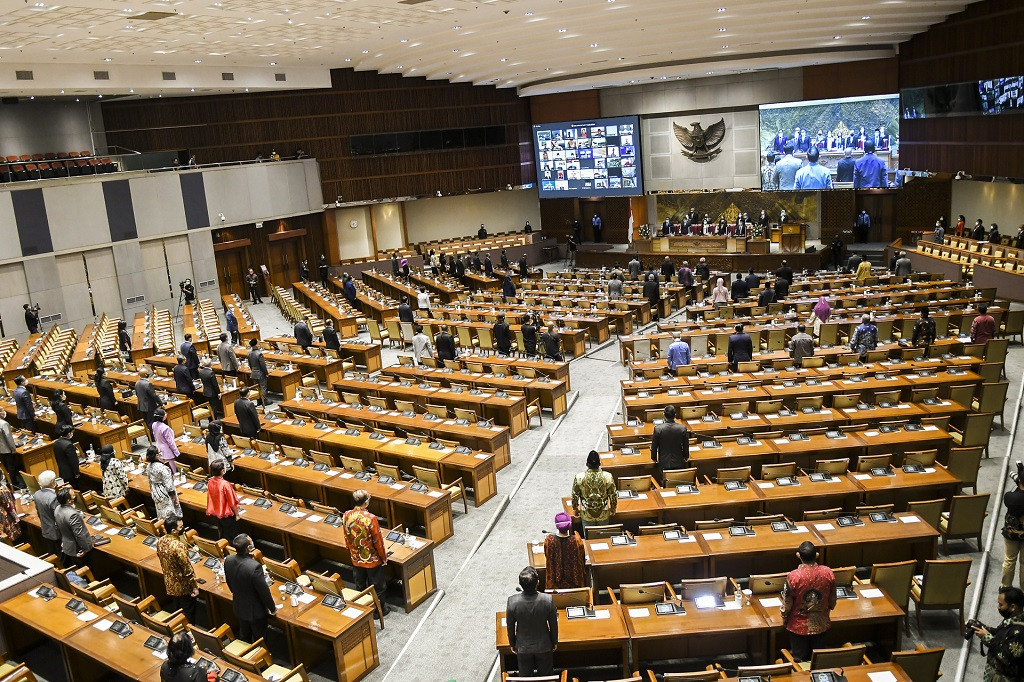Popular Reads
Top Results
Can't find what you're looking for?
View all search resultsPopular Reads
Top Results
Can't find what you're looking for?
View all search resultsHouse approves list of 33 priority bills for 2021
Law experts and observers are looking askance at the Indonesian legislature as it announces its 33 priority bills for the year, most of which are holdovers from last year, notwithstanding the legislature’s poor performance that lawmakers blamed on "the pandemic".
Change text size
Gift Premium Articles
to Anyone
T
he House of Representatives has only about seven months this year to deliberate dozens of priority bills, including the long-awaited bills on data protection and sexual violence, as well as a relatively new proposed bill on developing the nation's new capital city in Kalimantan.
The House has listed a total of 33 priority bills in the 2021 National Legislation Program (Prolegnas), which was approved in a plenary session on Tuesday.
The legislature had failed to finalize the list during its previous session that ended early last month, due to objections over a proposed bill to split and move the 2024 simultaneous regional elections to 2022 and 2023. Lawmakers agreed to remove the proposed regional elections bill from the priority list in favor of the government, which insisted on reevaluating the elections schedule only after the 2024 polls had taken place.
More than half of the priority bills have been carried over from last year, including those on the new capital city, renewable energy, alcohol prohibition, indigenous communities and the Papua special autonomy (Otsus).
Meanwhile, the personal data protection bill was initially proposed by the government seven years ago and its deliberation has been delayed several times since, the latest occasion in late 2020. The sexual violence bill has resurfaced on this year’s list after it was dropped last July amid public outcry and continuing calls for its urgent passage.
Read also: Ministry urges House to pass sexual violence bill immediately
Of the 33 bills, 10 were proposed by the government, 21 by the House and two by the Regional Legislative Council (DPD).
Marwan Cik Hasan, the secretary of the Democratic Party faction, called on lawmakers during Tuesday’s plenary session to prioritize the deliberation of certain bills on the Prolegnas due to time constraints, including the data protection and the Papua Otsus bills.
“We are aware that not all deliberations on the [Prolegnas] bills will be finished in 2021, […] considering we only have around seven to eight months left. And amid the COVID-19 pandemic, we should prioritize bills that directly respond to the needs of the public,” said Marwan.
The personal data protection bill contains provisions on law enforcement and punishment against the illegal use of personal data as well as guidelines on other measures to prevent data breaches. It also includes key principles that were adopted in the European Union’s General Data Protection Regulation (EU GDPR), considered the gold standard for data privacy in the world.
The bill was first proposed by the then-Communications Ministry in 2014, but only reached the discussion stage early last year under the previous legislature. It then stalled when the country declared the COVID-19 health emergency last March.
Activist Wahyudi Djafar from the Institute for Policy Research and Advocacy (Elsam) said that the disease outbreak that had forced “dramatic digital transformation in society, in fact makes it more urgent for the country” to pass the personal data protection law.
“This bill is actually not just about personal data protection, but also how to increase Indonesia’s competitiveness in the digital economy,” he stressed.
The sexual violence bill has returned to this year’s Prolegnas after the Prosperous Justice Party (PKS), one of the staunchest critics of the bill, appeared to soften its stance. The Islamist party initially deemed the bill as promoting adultery.
PKS lawmaker Al Muzammil Yusuf said earlier this month that the deliberation of the bill “should be mindful of national values” as reflected in the Pancasila state ideology and the 1945 Constitution.
Read also: Sexual violence eradication bill still faces resistance within House
The bill contains provisions that prohibit the criminalization of victims, including law enforcement agencies from blaming, denigrating or placing the burden of proof on victims of sexual violence.
Meanwhile, the bill on the new capital city is expected to provide legal clarity on financing the relocation of the nation’s capital from Jakarta to East Kalimantan by 2024. But details on the provisions in the bill remain unclear. Opposition party PKS said the bill should not be included in the 2021 Prolegnas, given that the COVID-19 crisis had strained the state budget.
Considering last year’s slow and often delayed legislative process, however, researcher Lucius Karus of Indonesian Parliament Watch (Formappi) doubted that the House would finish deliberating any bills this year.
The House blamed the pandemic for its poor performance last year, passing just three laws out of 37 Prolegnas bills and 10 non-priority bills: the Job Creation Omnibus Law, the Mining Law and the Constitutional Court Law.
Law experts and activists criticized the three enacted laws for supporting either business or political interests rather than the public interest, while others accused lawmakers of using the COVID-19 crisis as a pretext for conducting nontransparent deliberations.
"If they continue to give more focus to [bills] that accommodate their political interests than that of the public, I'd say some important bills will find it difficult to be passed this year," said senior researcher Feri Amsari of Andalas University’s Constitutional Studies Center, who criticized the House last year for its lackluster performance.
–Tri Indah Oktavianti contributed to this story.










